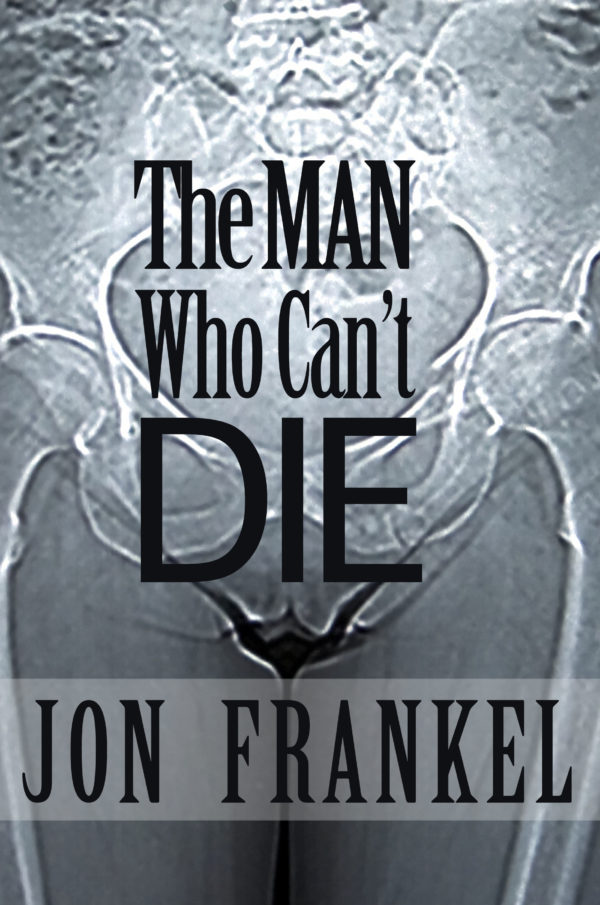 Reviewed by Judy Swann
Reviewed by Judy Swann
The Man Who Can’t Die
By Jon Frankel
Whiskey Tit
ISBN: 978-0996764636, 13 September 2016, Paperback, $16
Finally! A sexy, pharma-centric, sci-fi thriller that is both a novel of ideas and a really good read. Jon Frankel’s The Man Who Can’t Die is the story of a world governed by corporate elites, where life is miserable for most people and suicides are epidemic:
People aren’t just killing themselves, they’re mutilating their bodies first, setting themselves on fire and jumping out of buildings into crowds…A man came into emergency one night. He had chopped off his own left hand and before he bled to death, had managed to cut out his tongue.
In order to keep workers working, the Monozone corporation has developed Paregane, a non-addictive, side-effect-free euphoric. Its only negative is that it kills a random 10% of the people who take it. Paregane was synthesized by Dr. Ruth Bryson, a sympathetic and intelligent character whose work has been appropriated by the forces of evil. Anyway, Paregane is distributed worldwide – against her wishes – as a way to get the masses to accept their soulless jobs. Here, for example, is where Frankel’s protagonist, with the bell-ringingly perfect name “Felix Clay,” works:
Intellatrawl was an internet salvage company. Programs trawled the net for abandoned code, material out of copyright, expired patents, resalable content, rare ads, anything they could recover, own and sell. Turn around was important, but they kept huge inventories of junk that customers could search and buy. Felix supervised a thousand human search analysts, processors, traders and pricers.
In any case, Felix has come to a drug-free accommodation with his job:
The trick was to drink enough to prevent dehydration without overfilling the bladder. If he could make it to lunch without taking a piss he would have that much more time to eat, provided he started his sandwich on the bathroom line and continued to eat at the urinal. (30)
His beloved wife, Veronica, though, has not found a way to bear it all; and in her misery and desperation, she is prescribed Paregane, which transports her, literally, to Paradise:
They crossed a meadow of wild flowers, pink, crimson, yellow, orange spots floating over the stalks of grass. Hawks circled overhead; larks and robins flew up out of the field. Sparrows cheeped in hedges. Butterflies and bees hovered above the blossoms and insects crawled up and down the stalks.
Eventually, of course, Veronica does not even want to come back to the stinking apartment, dreams of Alaska, or meals made of extruded meat and mayo; and so she dies. This launches Felix on his own odyssey. He becomes a sort of screwy Orpheus; Felix is the man who can visit his otherworldly Eurydice ad libidum, but he himself can’t die.
The story is long, which works well for readers like me who hate to see a good book end; and the story is well-knit, which works well for scholars who want to tease out influences, tangents and themes. Frankel paints spot-on portraits of the male sex symbol, poor kids in privileged schools, Big Science, and environmentalists. Like Proust, he uses smell as a motif and a motivator. He wants us all to think about where we go when we die; what is the relationship between God the Father’s two male offspring, Jesus and Satan; and will bar-room society never, ever change?
But it’s not just the characters and the story and the erudition—it’s the language! Frankel always finds le mot juste. He makes you laugh out loud:
“Evening ma’am,” said the bartender, a man with premature wattles and eyes sagging down his face. He suffered from a rare wasting disease contracted after accidentally eating a mutant zebra mussel. The parasite was slowly eating its way through his connective tissue.
Frankel’s people take drugs lie SchizAvoid9000, Norave, and Comatode; there’s a character with “lemon-meringue hair.” He takes you to the “Greenhouse Mitigation Zones (GMZ’s)” where people speak Haudenosaunee, “hoya:neh” and “ga:syoje:tha.” People drink “Gulag Vodka.” He quotes Shelley, Milton, and Pound. The bodyguard/spy Boyle is a clown straight out of Shakespeare. Some of Frankel’s choicest language and scenes cannot be printed in a family newspaper, so you can either message me privately to know what they are, or read them for yourself—this latter being the better and more satisfying option.
Frankel’s publisher, Whiskey Tit, has a mission:
Whiskey Tit attempts to restore degradation and degeneracy to the literary arts. We are unwilling to sacrifice intellectual rigour, unrelenting playfulness, and visual beauty, often leading to texts that would otherwise be abandoned in a homogenised literary landscape (https://www.whiskeytit.com/about/). The Man Who Can’t Die is indeed, all that—intellectually rigorous and unrelentingly playful. Do dig in!
About the reviewer: Judy Swann is a poet and essayist who publishes fairly frequently, both in print and online. Her book of poetry, Fool (Kelsay Books) was released in December, 2018. Her book of essays on the cartoon superhero Stickman (John Young) was published in March, 2019.